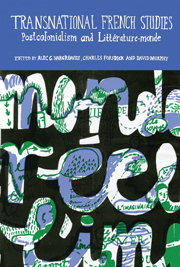Book contents
- Frontmatter
- Contents
- Acknowledgements
- Introduction: What Does Littérature-monde Mean for French, Francophone and Postcolonial Studies?
- From World Literature to Littérature-monde: Genre, History and the Globalization of Literature
- Postcolonialism, Politics and the ‘Becoming-Transnational’ of French Studies
- Mapping Littérature-monde
- Littérature-monde, or Redefining Exotic Literature?
- From Littérature voyageuse to Littérature-monde via Migrant Literatures: Towards an Ethics and Poetics of Littérature-monde through French-Australian Literature
- Littérature-monde and the Space of Translation, or, Where is Littérature-monde?
- Littérature-monde or Littérature océanienne? Internationalism versus Regionalism in Francophone Pacific Writing
- The World and the Mirror in Two Twenty-first-Century Manifestos: ‘Pour une “littérature-monde” en français’ and ‘Qui fait la France?’
- The Post-Genocidal African Subject: Patrice Nganang, Achille Mbembe and the Worldlinesss of Contemporary African Literature in French
- Afterword: The ‘World’ in World Literature
- Appendix: Toward a ‘World-Literature’ in French
- Notes on Contributors
The World and the Mirror in Two Twenty-first-Century Manifestos: ‘Pour une “littérature-monde” en français’ and ‘Qui fait la France?’
from Mapping Littérature-monde
- Frontmatter
- Contents
- Acknowledgements
- Introduction: What Does Littérature-monde Mean for French, Francophone and Postcolonial Studies?
- From World Literature to Littérature-monde: Genre, History and the Globalization of Literature
- Postcolonialism, Politics and the ‘Becoming-Transnational’ of French Studies
- Mapping Littérature-monde
- Littérature-monde, or Redefining Exotic Literature?
- From Littérature voyageuse to Littérature-monde via Migrant Literatures: Towards an Ethics and Poetics of Littérature-monde through French-Australian Literature
- Littérature-monde and the Space of Translation, or, Where is Littérature-monde?
- Littérature-monde or Littérature océanienne? Internationalism versus Regionalism in Francophone Pacific Writing
- The World and the Mirror in Two Twenty-first-Century Manifestos: ‘Pour une “littérature-monde” en français’ and ‘Qui fait la France?’
- The Post-Genocidal African Subject: Patrice Nganang, Achille Mbembe and the Worldlinesss of Contemporary African Literature in French
- Afterword: The ‘World’ in World Literature
- Appendix: Toward a ‘World-Literature’ in French
- Notes on Contributors
Summary
So I am ashamed for the black poet who says, ‘I want to be a poet, not a Negro poet’, as though his own racial world were not as interesting as any other world. I am ashamed, too, for the colored artist who runs from the painting of Negro faces to the painting of sunsets after the manner of the academicians because he fears the strange unwhiteness in his own features. An artist must be free to choose what he does, certainly, but he must also never be afraid to do what he must choose.
Langston Hughes, ‘The Negro Artist and the Racial Mountain’, Encyclopædia Britannica's Guide to Black History (1926)The ‘Pour une “littérature-monde” en français’ manifesto appeared in Le Monde in March 2007 only months before a group of authors mainly born of immigrant parents released their own literary manifesto, ‘Qui fait la France?’, to Les Inrockuptibles and Le Nouvel Observateur. Given the temporal proximity of these two manifestos, it is hard not to ask how their projects might compare, especially since both declarations are of considerable pertinence to debates on postcolonial authorship. In much the same vocabulary, both groups of authors – the first led by Michel Le Bris and the second by Mohamed Razane – issue a challenge to the concentration of political and publishing capital around Paris, and ultimately the social and literary reproduction that locks people and texts into categories of the past.
- Type
- Chapter
- Information
- Transnational French StudiesPostcolonialism and Littérature-monde, pp. 258 - 273Publisher: Liverpool University PressPrint publication year: 2010



